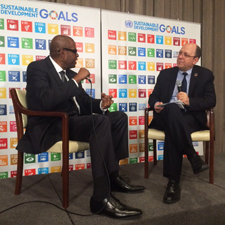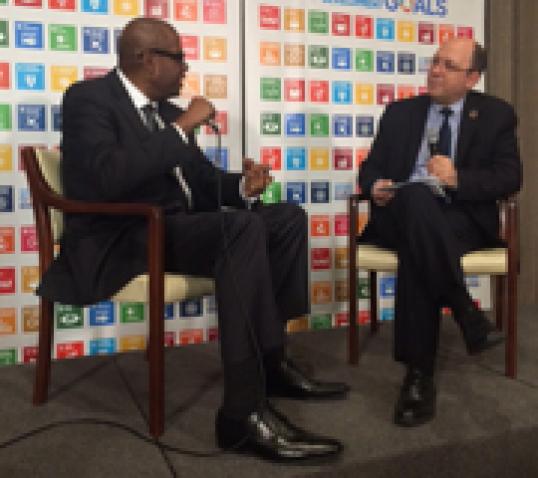“We have to remember that we are citizens of a country but also citizens of the world. […] What affects other people in the world also affects us,” said SDG Advocate and Academy Award-winning actor Forest Whitaker, during a discussion with Thomas Gass, Assistant Secretary-General for Policy Coordination and Inter-Agency Affairs in UN DESA, which took place in the Digital Media Zone at the High-Level Thematic Debate on Achieving the Sustainable Development Goals (SDGs) on 21 April.
Seeking to accelerate the implementation of the 2030 Agenda for Sustainable Development, the President of the UN General Assembly Mogens Lykketoft convened this event, bringing together global political leaders as well as high-level representatives from the business sector and from civil society organizations. Forest Whitaker was also one of the keynote speakers addressing the opening of this high-level event in the General Assembly Hall.
“In addition to advocating for these changes to the leaders and lawmakers in your countries, one of the most important things you can do in the service of these goals is to engage and inspire your fellow citizens to participate in this cause,” Mr. Whitaker said at the event, which also offered an opportunity to underscore the strong interlinkages between the 2030 Agenda and the Paris Agreement on Climate Change, which was signed the following day by 175 world leaders.
Universality key to ensure that no one is left behind
The 2030 Agenda for Sustainable Development and its 17 Sustainable Development Goals adopted last September, aim at leaving no one behind and to provide economic prosperity, social inclusion and environmental sustainability.
“It is now time to turn this agreement into policies and action, into laws and budget lines, and we need to ensure that people know what these goals promise, that people hold their leaders accountable and contribute to change,” said Thomas Gass during a press briefing with Forest Whitaker.
The universality and interconnectivity between the goals was a topic that came up frequently during the event. In her passionate address at the opening, SDG Advocate and Nobel Peace Laureate Leymah Gbowee, Director of the Gbowee Peace Foundation, touched upon this and also raised other actions necessary to achieve the 2030 Agenda.
“There is no way that we can […] roll out these goals, make it effective for the rest of the world, if we do it in the way we’ve been doing the world, from an individualistic perspective,” Ms. Gbowee said. “The goals are interdependent, the goals are interlinked and the goals are showing us, the rest of the world, humanity, how we should conduct business. Conduct it in a way that says we are all connected,” she stressed.
Making the goals real to people everywhere
 The UN Headquarters was buzzing with events and activities, and in the Digital Media Zone the dialogue between Mr. Whitaker and Mr. Gass kicked off a series of intimate conversations and interviews between experts, politicians and SDG Advocates, who all zoomed in on the SDGs and how we can make them a reality for people everywhere.
The UN Headquarters was buzzing with events and activities, and in the Digital Media Zone the dialogue between Mr. Whitaker and Mr. Gass kicked off a series of intimate conversations and interviews between experts, politicians and SDG Advocates, who all zoomed in on the SDGs and how we can make them a reality for people everywhere.“We need to take the goals seriously. That is why we are here today and tomorrow,” said Jeffrey Sachs, SDG Advocate and Director of The Earth Institute at Columbia University, as he discussed the goals with Cristina Gallach, UN Under-Secretary-General for Communications and Public Information.
“Don’t let them slip through your fingers, because it took three years to make these goals,” Mr. Sachs stressed. “Grab them, hold them and make them real,” he added, while stressing that we should all “look at the goals, understand them, and work together” by combining seriousness, planning and investment.
“Failure is simply no option”
Jeffrey Sachs and Forest Whitaker both agree: the 2030 Agenda is neither too ambitious, nor too idealistic, it is achievable. This was also stressed when Forest Whitaker, joined by Thomas Gass, as well as SDG Advocate and Ambassador Dho Young-Shim, on 22 April gathered at the Bronx Center for Science and Mathematics, a public high-school in the Bronx. With more than 400 students, they discussed the promises of the SDGs and how to make them a reality for everyone.
The pledge of these goals to leave no one behind is continuously highlighted by many and it was also stressed several times by Mr. Whitaker when he addressed the high-level event on 21 April.
“Our collective commitment to the 17 Sustainable Development Goals is our most important defence in ensuring that the benefits of our modernizing world are shared among all nations and people, and not just by the privileged few,” Mr. Whitaker said.
While stressing that “governments are in the drivers’ seat”, Deputy Secretary-General Jan Eliasson, who spoke on behalf of Secretary-General Ban Ki-moon, pointed out that this is the first year in our 15-year long and ambitious journey and that the UN system has already begun to support countries, both strategically and operationally, to implement the 2030 Agenda.
“We have a serious and noble mission which we must pursue for people today and for future generations,” Mr. Eliasson said. "This is our path to a better future for all. That is our duty, laid down in the UN Charter with its first three words “We the Peoples”. We are accountable to children and grandchildren all over the world – failure is simply no option.”
For more information:
High-level Thematic Debate on Achieving the Sustainable Development Goals
SDGs Advocates
VIDEO: UN DESA's Under-Secretary-General Wu Hongbo talks about progress and challenges for achieving Sustainable Development Goals
Sustainable Development Goals (SDGs)
Digital Media Zone

